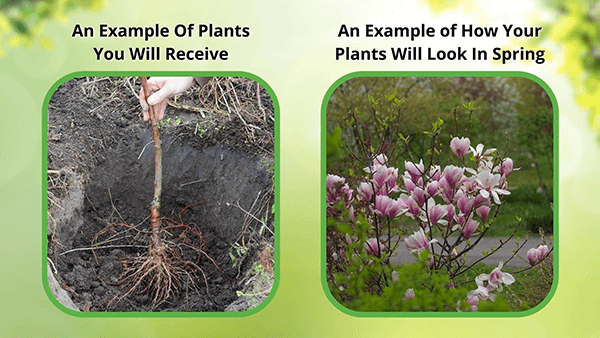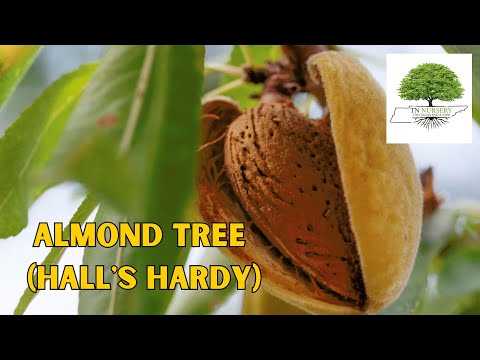Hall's Hardy Almond Tree
The Hall's Hardy Almond Tree (Prunus dulcis) is ancient. It is one of the earliest domesticated fruit trees, and is rarely found wild in its original setting. There is even archaeological evidence of domesticated almond nut trees found from the early Bronze Age in the Middle East – so this tree truly has been feeding us for centuries. It is in the peach family and has blooms similar to those of the cherry. Its fluffy, light pink flowers grace the branches in spring, filling the air with their sweet fragrance.
Hall's Hardy Almond Tree Details
Family: Rosaceae
Light Requirement: Full sun
Water Needs: Moderate
Height: 10-15 ft
Spread: 10-20 ft
Growth Rate: Moderate, Fast
Soil Preference: Fertile, well-draining
Season of Interest: Spring
Flower Color: Light Pink, White
Fruit: Drupes (Almonds)
Wildlife Value: Birds, Small mammals, Bees, Butterflies

Notable Characteristics
This Almond Tree is beautiful and unique. It bears fruit that has no flesh but is considered a drupe, as it has a stone “pit”. Where the flesh is on a peach or plum is instead a soft, woody exterior, which dries out as the season continues. As it dries, it breaks open to reveal the almond in its shell, which can then be broken open.
Therefore, almonds are not actually considered a nut; they are actually a drupe. The tree itself has woody, medium-sized branches in a warm brown. The leaves are long and oval-shaped with pointed tips, and are a glossy, bright green. The flowers are white or very light pink, somewhat resembling cherry blossoms, and are beautifully fragrant.
Landscape and Maintenance
This glorious tree is native to the Mediterranean because it thrives in warm, dry summers and mild, wet winters. Currently, California is responsible for growing 80% of the world's almonds, but the trees require a high amount of acreage and water to thrive. Given the increase in drought and temperature due to climate change, almond nut trees are likely to be on the decline.
The Hall's Hardy Almond Tree provides early-season nectar to hungry pollinators like bees and butterflies, and the almonds that drop as its husk dries out provide food for birds and small mammals. This fragrant, showy tree is an absolute gem to grow in your yard.

Customer Reviews
This Hall's Hardy Almond Tree is outstanding! It grew quickly, produces delicious almonds, and TN Nursery provided top-notch service throughout the purchase.
I love my Hall's Hardy Almond Tree from TN Nursery! It produces abundant, tasty almonds, and customer service was friendly and informative.
My Hall's Hardy Almond Tree is thriving beautifully. Nuts are sweet and crunchy, and TN Nursery made the whole process simple and enjoyable.
This Hall's Hardy Almond Tree is a star in my backyard. Nuts are rich and delicious, and TN Nursery ensured a smooth purchase experience from start to finish.
Hall's Hardy Almond from TN Nursery exceeded my expectations. The tree is healthy, and the customer support made ordering effortless.
How big do halls hardy almond trees get?
Hall’s Hardy Almond trees typically grow 15 to 20 feet tall with a similar spread. They have a graceful, rounded shape and stunning pink-white spring blooms. Compact and productive, they fit beautifully into home gardens and orchards.
How many years does it take an almond tree to produce fruit?
Almond trees typically start producing fruit in about 3 to 4 years after planting. Once mature, they yield abundant nuts every season. With good sunlight and care, they become both beautiful and productive landscape trees.
Is Hall's Hardy Almond self-pollinating?
Hall’s Hardy Almond is partially self-pollinating but produces a much larger crop when planted near another almond variety. Cross-pollination helps ensure better nut set and higher yields. Pairing it with a compatible variety leads to the best results.
Exposure
Water the Almond Tree regularly, especially during its first few years, to establish a deep root system. Trim in late winter to shape and remove dead wood. Fertilize in spring. Watch for pests and treat them as necessary.
Height at Maturity
Under 25 Feet
Usage
Nut
Shipped As
Bare-root
Ships
UPS
Planting Zones
5-9
How To Grow
How to Grow and Care for Fruit Trees
Fruit trees are a rewarding addition to any landscape, offering fragrant blossoms in spring and fresh, homegrown harvests in summer or fall. Popular varieties like apple, peach, pear, and plum thrive in full sun and well-drained, nutrient-rich soil. Choose trees suited to your USDA zone, and plant in early spring or fall for the best root development.
Dig a hole twice as wide as the root ball and deep enough so the root flare sits just above the soil line. Backfill with native soil, water deeply, and apply mulch around the base—keeping it a few inches from the trunk—to retain moisture and suppress weeds. Water regularly during the first growing season, especially during dry spells.
Prune annually to shape the tree, improve air circulation, and boost fruit production. Fertilize in early spring with a balanced or fruit-specific fertilizer. With proper planting, seasonal care, and a little patience, fruit trees will reward you with beauty, shade, and bountiful harvests year after year.







